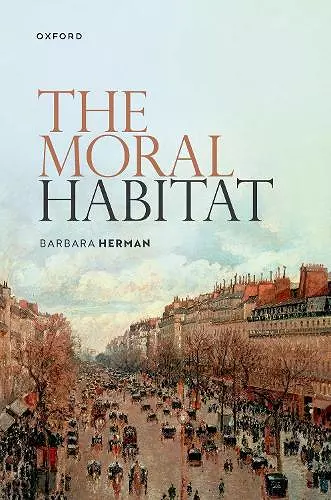The Moral Habitat
Format:Paperback
Publisher:Oxford University Press
Published:1st Nov '23
Should be back in stock very soon
This paperback is available in another edition too:
- Hardback£35.99was £35.99(9780192896353)

In The Moral Habitat, Barbara Herman offers a new and systematic interpretation of Kant's moral and political philosophy. The study begins with an investigation of some understudied imperfect duties which, surprisingly, tell us some important but generally unnoticed facts about what it is to be a moral agent. The second part of the book launches a substantial reinterpretation of Kant's ethics as a system of duties, juridical and ethical, perfect and imperfect, that can incorporate what we learn from imperfect duties and do much more. This system of duties provides the structure for what Herman calls a moral habitat: a made environment, created by and for free and equal persons living together. It is a dynamic system, with duties from different spheres shaping and being affected by each other, each level further interpreting its core anti-subordination value. In the final part, Herman takes up some implications and applications of this moral habitat idea, developing the resources of this holistic agent-centered Kantian view of morality by considering what would be involved, morally, in recognizing a human right to housing to meta-ethical issues about objectivity and our responsibility for moral change.
Those who love philosophy books that present new, exciting, and complex theories have been given a gift in Barbara Herman’s The Moral Habitat. In my view, it is also a gift to Kant, since it develops a deeply Kantian account of deliberation as part of showing how perfect and imperfect duties can be seen as working together in a dynamic moral (eco)system of duties of right and of virtue. In the process of doing this, Herman develops a new, intriguing account of imperfect duties and replaces many of Kant’s bad examples with good ones, providing an ideal model for how to argue by example, whether one is Kantian or not. * Helga Varden, Philosophical Review *
This is an outstanding book: wide-ranging, beautifully written, well-organized, tightly argued, worth reading by any philosopher...[It] has an organic unity that lends structure to its effective defense of many of the main systematic aims of Kant's critical ethics. Herman has followed Kant's own trajectory with the realization that our moral life goes beyond individual judgments, and even a general capacity for moral literacy, since it must always be part of an ongoing construction of a surrounding and ever more adequate form of what Herman calls a “moral habitat.”. [The] work's interpretative as well as substantive considerations are convincing, an exceptional contribution even in an era in which many others have also worked hard to make Kant's ethics appear more appealing and less encumbered by widespread mischaracterizations. * Karl Ameriks, Notre Dame Philosophical Reviews *
I have no doubt that The Moral Habitat will be an important book. It puts forward an original systematic approach that will be sure to stimulate lots of discussion. It is written in an engaging and sometimes eloquent way with a distinctive philosophical voice. And it addresses important concrete issues, including some that are badly neglected by moral philosophers, in ways that illuminate both the moral habitat approach and the issues themselves. Perhaps most importantly, it stimulates its reader to think and inspires confidence that thinking within the moral habitat project will bear real fruit * Stephen Darwall, Yale University *
With The Moral Habitat, Barbara Herman has produced a wonderful and significant contribution to our understanding of moral philosophy, of political philosophy, of how the two relate, and of Kant's practical philosophy. * Simon Hope, Ethics *
ISBN: 9780198906223
Dimensions: 235mm x 155mm x 150mm
Weight: 418g
272 pages